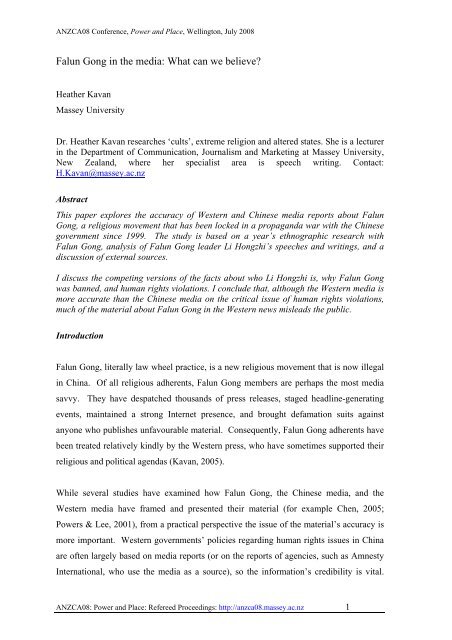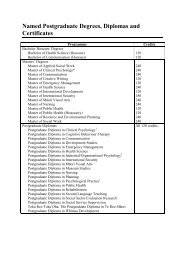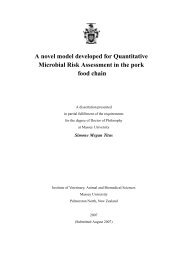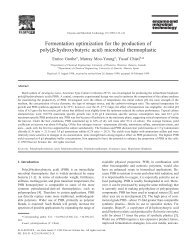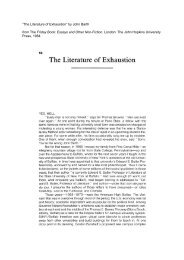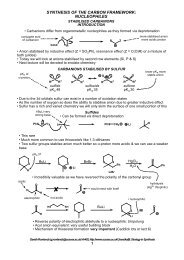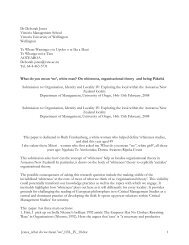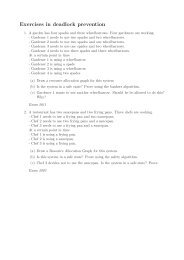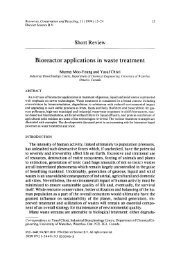Falun Gong in the media: What can we believe? - Massey University
Falun Gong in the media: What can we believe? - Massey University
Falun Gong in the media: What can we believe? - Massey University
Create successful ePaper yourself
Turn your PDF publications into a flip-book with our unique Google optimized e-Paper software.
ANZCA08 Conference, Po<strong>we</strong>r and Place, Well<strong>in</strong>gton, July 2008<br />
<strong>Falun</strong> <strong>Gong</strong> <strong>in</strong> <strong>the</strong> <strong>media</strong>: <strong>What</strong> <strong>can</strong> <strong>we</strong> <strong>believe</strong>?<br />
Hea<strong>the</strong>r Kavan<br />
<strong>Massey</strong> <strong>University</strong><br />
Dr. Hea<strong>the</strong>r Kavan researches ‘cults’, extreme religion and altered states. She is a lecturer<br />
<strong>in</strong> <strong>the</strong> Department of Communication, Journalism and Market<strong>in</strong>g at <strong>Massey</strong> <strong>University</strong>,<br />
New Zealand, where her specialist area is speech writ<strong>in</strong>g. Contact:<br />
H.Kavan@massey.ac.nz<br />
Abstract<br />
This paper explores <strong>the</strong> accuracy of Western and Ch<strong>in</strong>ese <strong>media</strong> reports about <strong>Falun</strong><br />
<strong>Gong</strong>, a religious movement that has been locked <strong>in</strong> a propaganda war with <strong>the</strong> Ch<strong>in</strong>ese<br />
government s<strong>in</strong>ce 1999. The study is based on a year’s ethnographic research with<br />
<strong>Falun</strong> <strong>Gong</strong>, analysis of <strong>Falun</strong> <strong>Gong</strong> leader Li Hongzhi’s speeches and writ<strong>in</strong>gs, and a<br />
discussion of external sources.<br />
I discuss <strong>the</strong> compet<strong>in</strong>g versions of <strong>the</strong> facts about who Li Hongzhi is, why <strong>Falun</strong> <strong>Gong</strong><br />
was banned, and human rights violations. I conclude that, although <strong>the</strong> Western <strong>media</strong> is<br />
more accurate than <strong>the</strong> Ch<strong>in</strong>ese <strong>media</strong> on <strong>the</strong> critical issue of human rights violations,<br />
much of <strong>the</strong> material about <strong>Falun</strong> <strong>Gong</strong> <strong>in</strong> <strong>the</strong> Western news misleads <strong>the</strong> public.<br />
Introduction<br />
<strong>Falun</strong> <strong>Gong</strong>, literally law wheel practice, is a new religious movement that is now illegal<br />
<strong>in</strong> Ch<strong>in</strong>a. Of all religious adherents, <strong>Falun</strong> <strong>Gong</strong> members are perhaps <strong>the</strong> most <strong>media</strong><br />
savvy. They have despatched thousands of press releases, staged headl<strong>in</strong>e-generat<strong>in</strong>g<br />
events, ma<strong>in</strong>ta<strong>in</strong>ed a strong Internet presence, and brought defamation suits aga<strong>in</strong>st<br />
anyone who publishes unfavourable material. Consequently, <strong>Falun</strong> <strong>Gong</strong> adherents have<br />
been treated relatively k<strong>in</strong>dly by <strong>the</strong> Western press, who have sometimes supported <strong>the</strong>ir<br />
religious and political agendas (Kavan, 2005).<br />
While several studies have exam<strong>in</strong>ed how <strong>Falun</strong> <strong>Gong</strong>, <strong>the</strong> Ch<strong>in</strong>ese <strong>media</strong>, and <strong>the</strong><br />
Western <strong>media</strong> have framed and presented <strong>the</strong>ir material (for example Chen, 2005;<br />
Po<strong>we</strong>rs & Lee, 2001), from a practical perspective <strong>the</strong> issue of <strong>the</strong> material’s accuracy is<br />
more important. Western governments’ policies regard<strong>in</strong>g human rights issues <strong>in</strong> Ch<strong>in</strong>a<br />
are often largely based on <strong>media</strong> reports (or on <strong>the</strong> reports of agencies, such as Amnesty<br />
International, who use <strong>the</strong> <strong>media</strong> as a source), so <strong>the</strong> <strong>in</strong>formation’s credibility is vital.<br />
ANZCA08: Po<strong>we</strong>r and Place: Refereed Proceed<strong>in</strong>gs: http://anzca08.massey.ac.nz 1
ANZCA08 Conference, Po<strong>we</strong>r and Place, Well<strong>in</strong>gton, July 2008<br />
Accuracy is also a critical issue <strong>in</strong> <strong>the</strong> numerous law suits <strong>Falun</strong> <strong>Gong</strong> have brought. In<br />
this light, specialist <strong>in</strong> Ch<strong>in</strong>ese studies Patsy Rahn’s (2000) suggestion to go beyond <strong>the</strong><br />
headl<strong>in</strong>es and <strong>in</strong>vestigate what is really happen<strong>in</strong>g <strong>in</strong> <strong>Falun</strong> <strong>Gong</strong> is apposite.<br />
My study is based on a year’s ethnographic research with <strong>Falun</strong> <strong>Gong</strong>. In this paper I<br />
will <strong>in</strong>ter<strong>we</strong>ave f<strong>in</strong>d<strong>in</strong>gs from my fieldwork with <strong>the</strong> different <strong>media</strong> accounts. I cover<br />
<strong>the</strong> news items from 1999 – when <strong>Falun</strong> <strong>Gong</strong> first burst <strong>in</strong>to <strong>the</strong> <strong>in</strong>ternational news – to<br />
<strong>the</strong> present. Ho<strong>we</strong>ver, most of my discussion focuses on <strong>the</strong> early period because this is<br />
when <strong>the</strong> key issues about <strong>Falun</strong> <strong>Gong</strong> <strong>we</strong>re raised.<br />
I will beg<strong>in</strong> by outl<strong>in</strong><strong>in</strong>g <strong>the</strong> background to <strong>Falun</strong> <strong>Gong</strong> and its relationship with <strong>the</strong><br />
<strong>media</strong>. Next I describe my fieldwork, follo<strong>we</strong>d by a discussion of sources. Then I will<br />
discuss <strong>the</strong> ma<strong>in</strong> issues <strong>in</strong> <strong>the</strong> <strong>media</strong>. I conclude by observ<strong>in</strong>g that while <strong>the</strong> Western<br />
<strong>media</strong> is more accurate than <strong>the</strong> Ch<strong>in</strong>ese <strong>media</strong> on <strong>the</strong> critical issue of human rights<br />
violations, much of <strong>the</strong> material about <strong>Falun</strong> <strong>Gong</strong> <strong>in</strong> <strong>the</strong> Western news misleads <strong>the</strong><br />
public.<br />
Background<br />
<strong>Falun</strong> <strong>Gong</strong> orig<strong>in</strong>s<br />
<strong>Falun</strong> <strong>Gong</strong>, also known as <strong>Falun</strong> Dafa, emerged <strong>in</strong> Ch<strong>in</strong>a <strong>in</strong> 1992 as a spiritual<br />
movement that was an offshoot of Qi <strong>Gong</strong> (sometimes called Ch<strong>in</strong>ese yoga). The<br />
movement’s leader is Li Hongzhi. Qi <strong>Gong</strong> is ma<strong>in</strong>ly comprised of breath<strong>in</strong>g exercises,<br />
but Li added teach<strong>in</strong>gs of a world full of demons, aliens and apocalyptic adventures. His<br />
books Zhuan <strong>Falun</strong> and <strong>Falun</strong> <strong>Gong</strong> read like an Asian version of <strong>the</strong> X Files and <strong>we</strong>re<br />
<strong>in</strong>stant best sellers. In 1998 Li reached celebrity status, and he shifted to <strong>the</strong> United<br />
States.<br />
<strong>Falun</strong> <strong>Gong</strong> and <strong>the</strong> <strong>media</strong><br />
Conflict with <strong>the</strong> <strong>media</strong> has been central to <strong>Falun</strong> <strong>Gong</strong> almost s<strong>in</strong>ce its <strong>in</strong>ception, for it<br />
was not <strong>the</strong> Ch<strong>in</strong>ese government, but journalists, writers, scientists and ex-members who<br />
first criticised <strong>Falun</strong> <strong>Gong</strong>. Li’s unscientific claims and professions of div<strong>in</strong>e status<br />
<strong>in</strong>vited scepticism, and by mid 1996 Ch<strong>in</strong>ese journalists began to publish critical articles<br />
about <strong>Falun</strong> <strong>Gong</strong>’s supernatural beliefs and Li’s egoism. In response, Li directed<br />
ANZCA08: Po<strong>we</strong>r and Place: Refereed Proceed<strong>in</strong>gs: http://anzca08.massey.ac.nz 2
ANZCA08 Conference, Po<strong>we</strong>r and Place, Well<strong>in</strong>gton, July 2008<br />
members to defend <strong>the</strong> fa (his spiritual law) whenever it was attacked (Deng & Fang,<br />
2000; Li, 1998a, 1998b). The protests <strong>we</strong>re large and relentless.<br />
Bet<strong>we</strong>en 1996 and mid-1999, practitioners <strong>in</strong>itiated over 300 protests aga<strong>in</strong>st negative<br />
<strong>media</strong> reports, forc<strong>in</strong>g dismissals of reporters and receiv<strong>in</strong>g public apologies (Zhao,<br />
2003). In Ch<strong>in</strong>a <strong>the</strong> <strong>media</strong> are free only as far as <strong>the</strong>y facilitate social stability (Chan,<br />
2002), so when <strong>Falun</strong> <strong>Gong</strong> threatened civil unrest, <strong>media</strong> managers <strong>we</strong>re quick to<br />
capitulate to <strong>the</strong>ir demands. For example, when 2,000 protestors surrounded Beij<strong>in</strong>g<br />
Television after <strong>the</strong> station broadcast a segment about a doctoral <strong>can</strong>didate who became<br />
psychotic while practis<strong>in</strong>g <strong>Falun</strong> <strong>Gong</strong>, <strong>the</strong> station fired <strong>the</strong> reporter, aired an im<strong>media</strong>te<br />
sympa<strong>the</strong>tic portrayal, and – to show extra goodwill – handed out 2,000 boxed lunches to<br />
<strong>the</strong> protestors.<br />
Hav<strong>in</strong>g learnt that such protests <strong>we</strong>re fruitful, <strong>Falun</strong> <strong>Gong</strong> members <strong>we</strong>re unstoppable.<br />
To prevent social unrest, Beij<strong>in</strong>g authorities <strong>in</strong>troduced a blackout aga<strong>in</strong>st any negative<br />
<strong>media</strong> reports on <strong>the</strong> movement (Zhao, 2003). Ho<strong>we</strong>ver, not everyone was aware of <strong>the</strong><br />
blackout, and an obscure academic magaz<strong>in</strong>e <strong>in</strong> Tianj<strong>in</strong> published a critique of <strong>Falun</strong><br />
<strong>Gong</strong> by renowned physicist He Zuox<strong>in</strong>. The article might have gone unnoticed, except<br />
that six thousand <strong>Falun</strong> <strong>Gong</strong> protestors occupied <strong>the</strong> <strong>University</strong> over three days,<br />
demand<strong>in</strong>g a retraction. The editors refused, respond<strong>in</strong>g that scientific publications do<br />
not pr<strong>in</strong>t retractions. The protest developed <strong>in</strong>to a riot – although this appears to have<br />
happened after <strong>the</strong> riot police arrived – and up to 45 people <strong>we</strong>re arrested (<strong>the</strong> numbers<br />
vary <strong>in</strong> different accounts).<br />
To appeal <strong>the</strong>ir alleged vilification and <strong>the</strong> arrests, <strong>Falun</strong> <strong>Gong</strong> made <strong>the</strong> tactical mistake<br />
for which <strong>the</strong>y are most remembered. On 25 April 1999 over 10,000 members silently<br />
converged on <strong>the</strong> sidewalks of Zhongnanhai and surrounded Communist party<br />
headquarters for t<strong>we</strong>lve hours. It is at this po<strong>in</strong>t that <strong>the</strong> story is taken up by X<strong>in</strong>hua<br />
(Ch<strong>in</strong>a’s news agency) and <strong>the</strong> Western <strong>media</strong>. Before discuss<strong>in</strong>g <strong>the</strong>se reports I will<br />
describe my fieldwork and sources.<br />
Fieldwork<br />
Several years ago, <strong>Falun</strong> <strong>Gong</strong> practitioners sent hundreds of letters to academic<br />
<strong>in</strong>stitutions request<strong>in</strong>g that unbiased research be done on <strong>the</strong>m, so, when a group<br />
ANZCA08: Po<strong>we</strong>r and Place: Refereed Proceed<strong>in</strong>gs: http://anzca08.massey.ac.nz 3
ANZCA08 Conference, Po<strong>we</strong>r and Place, Well<strong>in</strong>gton, July 2008<br />
advertised <strong>in</strong> New Zealand, I approached <strong>the</strong>m. Practitioners expect researchers to<br />
experience <strong>the</strong>ir spiritual path before <strong>the</strong>y make judgement on it; <strong>the</strong>refore I used a<br />
methodology drawn from Robert Bellah’s (1970) ideas about symbolic realism, of<br />
shift<strong>in</strong>g <strong>in</strong>to <strong>the</strong> person’s religious reality for fieldwork purposes.<br />
For over a year I met with <strong>Falun</strong> <strong>Gong</strong> members <strong>in</strong> New Zealand, outdoors bet<strong>we</strong>en 6<br />
and 7.30 am every morn<strong>in</strong>g to do <strong>Falun</strong> <strong>Gong</strong> exercises. I also attended <strong>we</strong>ekly<br />
demonstration meet<strong>in</strong>gs to which <strong>the</strong> public <strong>we</strong>re <strong>in</strong>vited. The participants – all Ch<strong>in</strong>ese<br />
– <strong>we</strong>lcomed and encouraged me: <strong>the</strong>y told me that <strong>the</strong>y <strong>we</strong>re used to outsiders because<br />
before <strong>the</strong> Government crackdown <strong>in</strong> Ch<strong>in</strong>a, undercover spies sometimes attended<br />
meet<strong>in</strong>gs – often for several years.<br />
Initially I did not <strong>in</strong>tend to focus my research on <strong>the</strong> <strong>media</strong>, but I soon discovered that<br />
this was highly important to members, as <strong>the</strong>y expressed disappo<strong>in</strong>tment that <strong>the</strong> Western<br />
<strong>media</strong> had not been uniformly supportive of <strong>the</strong>m. From <strong>the</strong>ir conversations and<br />
literature I got <strong>the</strong> impression that <strong>Falun</strong> <strong>Gong</strong> had high expectations of <strong>the</strong> Western<br />
<strong>media</strong>, anticipat<strong>in</strong>g that <strong>the</strong> press would take a stance and assume a moral role <strong>in</strong><br />
restor<strong>in</strong>g members’ religious rights <strong>in</strong> Ch<strong>in</strong>a. This view is highlighted by one of Li’s<br />
speeches <strong>in</strong> which he rails aga<strong>in</strong>st <strong>the</strong> <strong>media</strong> for “keep<strong>in</strong>g silent while crimes and s<strong>in</strong>s are<br />
committed” (Li, 2005a, p. 2).<br />
At <strong>the</strong> morn<strong>in</strong>g meet<strong>in</strong>gs nobody spoke, <strong>we</strong> took a place <strong>in</strong> a circle, closed our eyes, did<br />
<strong>the</strong> exercises, and usually left without say<strong>in</strong>g goodbye to each o<strong>the</strong>r. There was slightly<br />
more <strong>in</strong>teraction at o<strong>the</strong>r meet<strong>in</strong>gs, and I was careful not to direct <strong>the</strong> conversation as I<br />
wanted to see what issues <strong>we</strong>re important to <strong>the</strong> participants. I did not ask set questions<br />
as I was aware that practitioners had standard ans<strong>we</strong>rs to particular l<strong>in</strong>es of enquiry<br />
(Frank, 2004), and I focused on ensur<strong>in</strong>g that I understood <strong>the</strong>ir perspectives correctly.<br />
Ho<strong>we</strong>ver, as I do not speak Ch<strong>in</strong>ese and could not claim any experience of be<strong>in</strong>g<br />
persecuted or tortured, I was never fully part of <strong>the</strong> group. Also, many of <strong>the</strong> members<br />
<strong>we</strong>re biologically related to each o<strong>the</strong>r (most came to <strong>the</strong> movement through a family<br />
member). With <strong>the</strong> exception of two spokespeople, I do not know <strong>the</strong> names of <strong>the</strong><br />
participants. Once, when I asked <strong>the</strong> name of a woman with whom I had met every day<br />
for over a year, I was told to call her “<strong>the</strong> woman”.<br />
ANZCA08: Po<strong>we</strong>r and Place: Refereed Proceed<strong>in</strong>gs: http://anzca08.massey.ac.nz 4
ANZCA08 Conference, Po<strong>we</strong>r and Place, Well<strong>in</strong>gton, July 2008<br />
The cultural barrier also meant that I sometimes did not fully understand how participants<br />
<strong>in</strong>terpreted events. For example, on one occasion a practitioner had been practis<strong>in</strong>g alone<br />
<strong>in</strong> her front yard when – accord<strong>in</strong>g to her account – she saw me stand<strong>in</strong>g next to her<br />
do<strong>in</strong>g <strong>the</strong> exercises, although I was, <strong>in</strong> fact, over two kilometres away at <strong>the</strong> time. Over<br />
<strong>the</strong> next <strong>we</strong>ek members looked <strong>in</strong> my direction, whispered <strong>in</strong> Ch<strong>in</strong>ese and giggled. I am<br />
not sure how <strong>the</strong>y <strong>in</strong>terpreted <strong>the</strong> event, although <strong>the</strong> <strong>in</strong>cident did not impede our<br />
relationship.<br />
Over <strong>the</strong> year, I immersed myself <strong>in</strong> <strong>Falun</strong> <strong>Gong</strong> material – Li’s speeches, videos, books,<br />
and <strong>Falun</strong> <strong>Gong</strong> publications. Li’s coercive and <strong>in</strong>flated style (which Dean Peerman<br />
describes as “gaseous-cosmic” [2004, p. 30]) contrasted with <strong>the</strong> polite and humble<br />
nature of <strong>the</strong> participants. More signifi<strong>can</strong>tly, Li’s speeches repeatedly contradicted both<br />
what <strong>Falun</strong> <strong>Gong</strong> members <strong>we</strong>re tell<strong>in</strong>g me and what <strong>the</strong>y <strong>we</strong>re tell<strong>in</strong>g <strong>the</strong> <strong>media</strong>. I had<br />
hoped that my research would help <strong>Falun</strong> <strong>Gong</strong>, but I became <strong>in</strong>creas<strong>in</strong>gly aware that this<br />
would be unlikely.<br />
While my fieldwork was <strong>in</strong> New Zealand, this paper focuses more broadly on <strong>the</strong><br />
<strong>in</strong>ternational <strong>media</strong>. Although my location is a limitation (especially as <strong>the</strong>re are only<br />
approximately 100 <strong>Falun</strong> <strong>Gong</strong> members <strong>in</strong> New Zealand), <strong>Falun</strong> <strong>Gong</strong> practices are <strong>the</strong><br />
same throughout <strong>the</strong> world. There are no variations of <strong>the</strong> teach<strong>in</strong>gs because Li threatens<br />
that if anyone <strong>in</strong>advertently alters <strong>the</strong> teach<strong>in</strong>gs when speak<strong>in</strong>g to outsiders, <strong>the</strong>y will be<br />
attacked by demons and die (Li, 1998b). Therefore my general experiences tally with<br />
overseas accounts of <strong>Falun</strong> <strong>Gong</strong> practice (for example, Burgdoff, 2003; Frank, 2004;<br />
Porter, 2003). Ho<strong>we</strong>ver, my conclusions are less favourable to <strong>Falun</strong> <strong>Gong</strong> than previous<br />
researchers, who <strong>we</strong>re writ<strong>in</strong>g at a time when some of <strong>Falun</strong> <strong>Gong</strong>’s more extreme<br />
political writ<strong>in</strong>gs had not been published.<br />
Sources<br />
For both <strong>the</strong> Ch<strong>in</strong>ese and Western <strong>media</strong>, I retrieved articles from Factiva database by<br />
typ<strong>in</strong>g <strong>Falun</strong> <strong>Gong</strong> and its alternative name <strong>Falun</strong> Dafa <strong>in</strong>to <strong>the</strong> search eng<strong>in</strong>e. For <strong>the</strong><br />
Ch<strong>in</strong>ese press reports I read all accounts dissem<strong>in</strong>ated by X<strong>in</strong>hua. X<strong>in</strong>hua is Ch<strong>in</strong>a’s<br />
pr<strong>in</strong>cipal news agency, controlled by <strong>the</strong> state-run Department of Propaganda. Their<br />
material is difficult to verify as orig<strong>in</strong>al sources are usually <strong>in</strong>accessible to Westerners.<br />
ANZCA08: Po<strong>we</strong>r and Place: Refereed Proceed<strong>in</strong>gs: http://anzca08.massey.ac.nz 5
ANZCA08 Conference, Po<strong>we</strong>r and Place, Well<strong>in</strong>gton, July 2008<br />
The Western <strong>media</strong> get most of <strong>the</strong>ir <strong>in</strong>formation about <strong>Falun</strong> <strong>Gong</strong> from press releases<br />
dissem<strong>in</strong>ated by <strong>the</strong> Rachl<strong>in</strong> <strong>media</strong> group. This group is essentially a Public Relations<br />
firm for <strong>Falun</strong> <strong>Gong</strong>, managed by Gail Rachl<strong>in</strong>, who is one of Li’s <strong>in</strong>ner circle.<br />
Journalists also get <strong>the</strong>ir stories from <strong>in</strong>terview<strong>in</strong>g participants. Ho<strong>we</strong>ver, Li forbids<br />
practitioners from talk<strong>in</strong>g about what he calls “high level th<strong>in</strong>gs” to ord<strong>in</strong>ary people, and<br />
<strong>in</strong>structs <strong>the</strong>m to lie to those un<strong>in</strong>terested <strong>in</strong> spiritual matters (“tell <strong>the</strong>m that <strong>we</strong>’re just<br />
do<strong>in</strong>g exercises” [Li, 2002, p. 21]). Therefore spokespeople tend to be evasive about<br />
<strong>the</strong>ir beliefs, and resort to formulaic pr<strong>in</strong>ciples and repetitions of <strong>the</strong>ir slogan<br />
‘truthfulness, compassion, forbearance’. Moreover, Li sets <strong>the</strong> terms of <strong>the</strong> debate by<br />
direct<strong>in</strong>g members to get sympathy by tell<strong>in</strong>g listeners about <strong>the</strong> persecution, with <strong>the</strong><br />
hidden <strong>in</strong>tention of later turn<strong>in</strong>g <strong>the</strong>m <strong>in</strong>to converts (Li cited <strong>in</strong> Rahn, 2005; see also Li,<br />
2002, 2003a). Members do not see this strategy as deceptive: a <strong>Falun</strong> <strong>Gong</strong><br />
spokesperson told me that by focus<strong>in</strong>g on <strong>the</strong> persecution and not push<strong>in</strong>g <strong>the</strong>ir religion<br />
or leader, members <strong>we</strong>re be<strong>in</strong>g <strong>in</strong>offensive.<br />
Generally, practitioners do not know if <strong>the</strong> <strong>in</strong>formation <strong>in</strong> <strong>the</strong> <strong>media</strong> is accurate. They<br />
<strong>the</strong>mselves get most of <strong>the</strong>ir <strong>in</strong>formation from read<strong>in</strong>g press releases, and usually if I<br />
asked <strong>the</strong>m if someth<strong>in</strong>g was true <strong>the</strong>y replied, “Yes – I read it <strong>in</strong> <strong>the</strong> newspaper”. <strong>Falun</strong><br />
<strong>Gong</strong> also have <strong>the</strong>ir own <strong>media</strong> (Li, 2005b), and are heavily <strong>in</strong>volved <strong>in</strong> <strong>the</strong> Epoch<br />
Times, a free newspaper that is most <strong>we</strong>ll known for its polemic N<strong>in</strong>e commentaries on<br />
<strong>the</strong> Ch<strong>in</strong>ese Communist Party, which Li promotes (Li, 2005c).<br />
As practitioners do not teach <strong>Falun</strong> <strong>Gong</strong> beliefs, I found more <strong>in</strong>formation from Li’s<br />
books and speeches. Copies are available on <strong>the</strong> Internet, but <strong>the</strong>y are not necessarily <strong>the</strong><br />
same as <strong>the</strong> orig<strong>in</strong>als. For example, disciples removed a chapter of Li’s improbable<br />
autobiographical claims of supernatural exploits from Zhuan <strong>Falun</strong>, as <strong>we</strong>ll as from <strong>the</strong><br />
Internet (see Penny, 2003 for a discussion on <strong>the</strong> content). They also removed English<br />
translations of Zhuan <strong>Falun</strong> 11, a book <strong>in</strong> which Li makes several scientific slip-ups<br />
(such as mistak<strong>in</strong>g a light year for a measurement of time) and offends potential<br />
supporters by condemn<strong>in</strong>g homosexuality and Buddhism. Curiously, when I asked a<br />
research assistant to translate parts of Zhuan <strong>Falun</strong> 11 for me, his car was broken <strong>in</strong>to<br />
after he left my office, and my <strong>in</strong>structions on what to translate <strong>we</strong>re stolen. Although I<br />
ANZCA08: Po<strong>we</strong>r and Place: Refereed Proceed<strong>in</strong>gs: http://anzca08.massey.ac.nz 6
ANZCA08 Conference, Po<strong>we</strong>r and Place, Well<strong>in</strong>gton, July 2008<br />
am sure this event was a co<strong>in</strong>cidence, it helped me to appreciate <strong>the</strong> war<strong>in</strong>ess <strong>Falun</strong> <strong>Gong</strong><br />
and <strong>the</strong> Ch<strong>in</strong>ese government have of each o<strong>the</strong>r.<br />
Fur<strong>the</strong>r, as Deng and Fang (2000) observe, English translations of Li’s speeches have a<br />
less strident tone, <strong>the</strong>y sometimes differ from <strong>the</strong> orig<strong>in</strong>al Ch<strong>in</strong>ese <strong>in</strong> critical parts, and<br />
<strong>the</strong> most anti-gay, racist and anti-human scriptures have never been translated <strong>in</strong>to<br />
English. Also, Li has <strong>in</strong>structed follo<strong>we</strong>rs to destroy any unauthorised versions of his<br />
speeches (1998b).<br />
While <strong>the</strong>se sources shed some light on <strong>Falun</strong> <strong>Gong</strong> beliefs, an equally critical issue <strong>in</strong><br />
relation to <strong>Falun</strong> <strong>Gong</strong> is <strong>the</strong> torture and persecution of members. The press often quote<br />
Amnesty International, but Amnesty’s reports are not <strong>in</strong>dependently verified, and ma<strong>in</strong>ly<br />
come from <strong>Falun</strong> <strong>Gong</strong> sources (for example, Amnesty, 2000). The Hong Kong Centre<br />
for Human Rights is <strong>the</strong> only <strong>in</strong>dependent source of <strong>in</strong>formation, although <strong>the</strong> Centre is<br />
actually not an organisation, but one man – Lu Si Q<strong>in</strong>g. Ho<strong>we</strong>ver, statistics of arrests<br />
from both Amnesty and <strong>the</strong> Hong Kong Centre are often much higher than those reported<br />
by Western journalists who <strong>we</strong>re present <strong>in</strong> Ch<strong>in</strong>a when <strong>the</strong> arrests <strong>we</strong>re made (Rahn,<br />
2000), which suggests that o<strong>the</strong>r <strong>in</strong>formation may be similarly exaggerated.<br />
The <strong>media</strong> stories<br />
The news items generally beg<strong>in</strong> at <strong>the</strong> time of <strong>the</strong> Zhongnanhai protest. To resume <strong>the</strong><br />
story, Ch<strong>in</strong>a’s Premier Zhu Rongji told <strong>the</strong> protestors that <strong>the</strong>ir grievances would be<br />
addressed with<strong>in</strong> three days. One participant told me that he “was very nice” and <strong>the</strong><br />
crowd <strong>we</strong>nt home delighted. Ho<strong>we</strong>ver, on July 22 1999 <strong>the</strong> government did an aboutturn:<br />
<strong>Falun</strong> <strong>Gong</strong> was declared an ‘evil cult’, <strong>the</strong> religion was outla<strong>we</strong>d, and members<br />
<strong>we</strong>re arrested. The Western and Ch<strong>in</strong>ese <strong>media</strong> give contradictory accounts.<br />
Li Hongzhi<br />
The first issue was Li’s role <strong>in</strong> <strong>the</strong> protest. The Western press quoted Li and his<br />
spokespeople who said that <strong>the</strong> protest was spontaneous, that Li was on his way to a<br />
conference <strong>in</strong> Australia at <strong>the</strong> time, and had no knowledge of it. This seems unlikely<br />
because all <strong>Falun</strong> <strong>Gong</strong> decisions have to be pre-approved by Li, no matter where he is<br />
(Li, 1995). In contrast, X<strong>in</strong>hua claimed that Li was on North<strong>we</strong>st Airl<strong>in</strong>e Flight 087 to<br />
ANZCA08: Po<strong>we</strong>r and Place: Refereed Proceed<strong>in</strong>gs: http://anzca08.massey.ac.nz 7
ANZCA08 Conference, Po<strong>we</strong>r and Place, Well<strong>in</strong>gton, July 2008<br />
Ch<strong>in</strong>a on April 22 and stayed for two days. X<strong>in</strong>hua (1999c) also presented evidence that<br />
Li ordered disciples to protest. Over a month after his <strong>in</strong>itial denials, Li changed his<br />
story, and admitted to journalist Paul Flat<strong>in</strong> (1999b) what X<strong>in</strong>hua had been report<strong>in</strong>g<br />
from <strong>the</strong> outset: that he was <strong>in</strong> Ch<strong>in</strong>a on <strong>the</strong> eve of <strong>the</strong> protest. X<strong>in</strong>hua’s reports <strong>the</strong>refore<br />
seem more plausible than <strong>the</strong> <strong>in</strong>itial Western ones, although <strong>we</strong> may be question how <strong>the</strong><br />
Ch<strong>in</strong>ese government ga<strong>in</strong>ed <strong>the</strong>ir <strong>in</strong>formation (apparently Li’s co-conspirators<br />
‘confessed’).<br />
The descriptions of Li also vary bet<strong>we</strong>en Ch<strong>in</strong>a and <strong>the</strong> West. The Western <strong>media</strong>,<br />
tak<strong>in</strong>g <strong>the</strong>ir <strong>in</strong>itial stories from <strong>in</strong>terviews with Li, describe him as a bright, baby-faced<br />
man who looks more like a bus<strong>in</strong>essman than a guru, and who “may be wacky, but he’s<br />
no counterrevolutionary” (Liu, 1999, para. 2). Flat<strong>in</strong> writes that “with his round, soft,<br />
Buddha-like features and smil<strong>in</strong>g brown eyes, <strong>the</strong> cheerful Li hardly seemed like <strong>the</strong><br />
illustrious spiritual leader of millions of Ch<strong>in</strong>ese” (1999a, para. 19). Numerous <strong>media</strong><br />
quote Li’s story that he was spiritually cultivat<strong>in</strong>g at <strong>the</strong> age of four, and at t<strong>we</strong>lve years<br />
of age was discovered by a Taoist immortal from <strong>the</strong> mounta<strong>in</strong>s. Reportedly, hav<strong>in</strong>g<br />
founded <strong>Falun</strong> <strong>Gong</strong>, he now leads a simple life from his New York apartment, and is a<br />
“family-values nostalgist” (Ros<strong>in</strong>, 1999, para. 11). With some exceptions (especially<br />
Hitchens, 2000), Li is portrayed as a hero, a man who, like Gandhi, mobilised millions of<br />
disciples to non-violently resist an oppressive regime. In 1999 he was nom<strong>in</strong>ated by six<br />
countries for <strong>the</strong> Nobel peace prize, and <strong>in</strong> 2001 Asia Week named Li <strong>the</strong> most po<strong>we</strong>rful<br />
communicator <strong>in</strong> Asia (Number 1, 2001).<br />
Not surpris<strong>in</strong>gly, <strong>the</strong> Ch<strong>in</strong>ese <strong>media</strong> have a different view of Li. Accord<strong>in</strong>g to X<strong>in</strong>hua,<br />
far from be<strong>in</strong>g a child spiritual protégé, he only began practis<strong>in</strong>g Qi <strong>Gong</strong> a year before<br />
he started <strong>Falun</strong> <strong>Gong</strong>, and when he began <strong>Falun</strong> <strong>Gong</strong> he copied <strong>the</strong> physical exercises<br />
from Qi <strong>Gong</strong> and hand movements from Thai dances. Once <strong>in</strong> po<strong>we</strong>r, Li enticed,<br />
bra<strong>in</strong>washed and <strong>in</strong>timidated follo<strong>we</strong>rs. He forbade members to take medic<strong>in</strong>es and go to<br />
hospitals (while do<strong>in</strong>g so himself), leav<strong>in</strong>g practitioners to die <strong>in</strong> agony while he did<br />
noth<strong>in</strong>g to help <strong>the</strong>m, aside from boast<strong>in</strong>g that he could heal by simply wav<strong>in</strong>g his hand.<br />
While “hoot<strong>in</strong>g” that only he could save <strong>the</strong> world (X<strong>in</strong>hua, 2001a, para.1), he amassed a<br />
fortune for himself, liv<strong>in</strong>g <strong>in</strong> his luxury home off <strong>the</strong> profits from his propaganda, and<br />
visit<strong>in</strong>g bro<strong>the</strong>ls (X<strong>in</strong>hua, 1999a, 1999d). He is now <strong>in</strong> <strong>the</strong> USA enjoy<strong>in</strong>g <strong>the</strong> good life.<br />
ANZCA08: Po<strong>we</strong>r and Place: Refereed Proceed<strong>in</strong>gs: http://anzca08.massey.ac.nz 8
ANZCA08 Conference, Po<strong>we</strong>r and Place, Well<strong>in</strong>gton, July 2008<br />
In some respects, Western and Ch<strong>in</strong>ese accounts are not as polarised as one would<br />
expect. Like X<strong>in</strong>hua, <strong>the</strong> Western press also publicised some of Li’s unusual beliefs. For<br />
example, <strong>in</strong> an <strong>in</strong>terview with Van Biema (1999) of Time magaz<strong>in</strong>e, Li talked of his<br />
apocalyptic visions, and warned that ghostly-look<strong>in</strong>g aliens are <strong>in</strong>filtrat<strong>in</strong>g human m<strong>in</strong>ds<br />
to corrupt and ultimately replace humans. Ho<strong>we</strong>ver, later, when Hanna Ros<strong>in</strong> (1999) of<br />
<strong>the</strong> Wash<strong>in</strong>gton Post questioned Li about <strong>the</strong>se beliefs, he responded that he merely<br />
meant <strong>the</strong>m as Buddhist metaphors. As Li no longer gives <strong>in</strong>terviews, and more recent<br />
accounts come largely from <strong>the</strong> Rachl<strong>in</strong> <strong>media</strong> group, his unusual ideas are less reported<br />
today.<br />
Regard<strong>in</strong>g his spiritual status, Li was ambiguous when speak<strong>in</strong>g to <strong>the</strong> Western <strong>media</strong>.<br />
While he said modestly to ABC news, “Don’t make me <strong>in</strong>to a God” (implant<strong>in</strong>g <strong>the</strong> idea<br />
that one could easily make this mistake when encounter<strong>in</strong>g him), to Time magaz<strong>in</strong>e,<br />
“You <strong>can</strong> th<strong>in</strong>k of me as a human be<strong>in</strong>g”, and to The Times “I’m not say<strong>in</strong>g I’m higher<br />
than Jesus Christ,” he is more forthright with disciples (Do<strong>we</strong>ll, 1999, ans<strong>we</strong>r 30;<br />
Greenberg, 1999, p. 2; Kirsta, 1999, para. 34). At conventions he claims not just to be a<br />
God, but <strong>the</strong> best God, superior to Buddha and Jesus whom he dismisses as merely<br />
teach<strong>in</strong>g 16 carat gold paths compared with his 24 carat gold path (Li, 1998c, 2003a). He<br />
also encourages veneration, tell<strong>in</strong>g disciples that his spiritual body is so large that, if he<br />
appeared <strong>in</strong> it, disciples would be look<strong>in</strong>g upward from under his big toe (Li, 1999).<br />
Why <strong>Falun</strong> <strong>Gong</strong> was banned<br />
When <strong>the</strong> story of <strong>Falun</strong> <strong>Gong</strong> broke <strong>in</strong> <strong>the</strong> West, commentators ridiculed Communist<br />
leaders for launch<strong>in</strong>g <strong>the</strong> equivalent of a counter-terrorist attack on a group of “exercis<strong>in</strong>g<br />
grannies” (Mosher, 1999, para. 1). Referr<strong>in</strong>g to <strong>the</strong> fact that <strong>Falun</strong> <strong>Gong</strong> ma<strong>in</strong>ly<br />
comprises breath<strong>in</strong>g exercises, Time Asia opened its story by announc<strong>in</strong>g that it had now<br />
become illegal to brea<strong>the</strong> <strong>in</strong> Ch<strong>in</strong>a (Spaeth, 1999). To expla<strong>in</strong> <strong>Falun</strong> <strong>Gong</strong>’s illegal<br />
status, <strong>the</strong> Western <strong>media</strong> repeatedly quote members’ claim that <strong>the</strong> Ch<strong>in</strong>ese government<br />
outla<strong>we</strong>d <strong>Falun</strong> <strong>Gong</strong> because Li had more follo<strong>we</strong>rs than <strong>the</strong> Communist party (100<br />
million compared with 60-70 million). This assertion seems unlikely for two reasons.<br />
First, scholars agree that <strong>the</strong> number of <strong>Falun</strong> <strong>Gong</strong> adherents was bet<strong>we</strong>en two to ten<br />
million, not 100 million (see Bruseker, 2000, p. 52; Major religions, n.d, p. 24 ). Second,<br />
<strong>the</strong>re <strong>we</strong>re equally popular Qi <strong>Gong</strong> groups <strong>in</strong> Ch<strong>in</strong>a which <strong>we</strong>re not banned.<br />
ANZCA08: Po<strong>we</strong>r and Place: Refereed Proceed<strong>in</strong>gs: http://anzca08.massey.ac.nz 9
ANZCA08 Conference, Po<strong>we</strong>r and Place, Well<strong>in</strong>gton, July 2008<br />
Counter<strong>in</strong>g <strong>the</strong> Western reports, X<strong>in</strong>hua (1999b) claims that <strong>the</strong> Western <strong>media</strong> portray<br />
<strong>Falun</strong> <strong>Gong</strong> as a harmless meditation group to make Ch<strong>in</strong>a look ridiculous. The agency<br />
produced a stream of articles expla<strong>in</strong><strong>in</strong>g that <strong>the</strong> Ch<strong>in</strong>ese government banned <strong>Falun</strong> <strong>Gong</strong><br />
because Li had broken numerous laws, threatened public safety, was responsible for over<br />
1,000 deaths (ma<strong>in</strong>ly from members committ<strong>in</strong>g suicide or not seek<strong>in</strong>g medical<br />
treatment), and because members had <strong>in</strong>filtrated <strong>the</strong> Communist party to overthrow <strong>the</strong><br />
government.<br />
On <strong>the</strong> issue of <strong>Falun</strong> <strong>Gong</strong>’s responsibility for numerous deaths, practitioners told me<br />
that <strong>the</strong>y did not know whe<strong>the</strong>r <strong>the</strong> <strong>in</strong>cidents occurred, but <strong>the</strong>y <strong>we</strong>re sure that <strong>the</strong> deaths<br />
did not stem from <strong>Falun</strong> <strong>Gong</strong> beliefs. Members also said that Li does not discourage<br />
people from gett<strong>in</strong>g medical assistance. Ho<strong>we</strong>ver, this claim does not tally with Li’s<br />
writ<strong>in</strong>gs. He teaches that illnesses are caused by karma, and that by tak<strong>in</strong>g medic<strong>in</strong>es or<br />
gett<strong>in</strong>g medical help one presses <strong>the</strong> karma back <strong>in</strong>to <strong>the</strong> body. The sign of a true<br />
practitioner is to refuse medic<strong>in</strong>e or medical care (Li, 1998b; 1998c; 1999; 2001a;<br />
2003b).<br />
The second issue – that <strong>Falun</strong> <strong>Gong</strong> <strong>in</strong>filtrated <strong>the</strong> Communist party – is not disputed.<br />
<strong>Falun</strong> <strong>Gong</strong> had permeated <strong>the</strong> state’s military, security, <strong>media</strong> and educational<br />
establishments. Also, <strong>in</strong> <strong>Falun</strong> <strong>Gong</strong> Li writes about his focus on ga<strong>in</strong><strong>in</strong>g support from<br />
state government leaders, and <strong>the</strong>se statements have suspiciously been omitted from <strong>the</strong><br />
English and French translations (Deng & Fang, 2000). Even so, <strong>the</strong>re is no evidence that<br />
<strong>in</strong> <strong>the</strong> early stages Li planned to topple <strong>the</strong> Communist party. To be sure, members today<br />
are political. They yearn for <strong>the</strong> demise of <strong>the</strong> party - parad<strong>in</strong>g down streets s<strong>in</strong>g<strong>in</strong>g “no<br />
more Communist party, no more torture”, surround<strong>in</strong>g Ch<strong>in</strong>ese embassies silently<br />
chant<strong>in</strong>g “all evil be destroyed”, and triumphantly share any news suggest<strong>in</strong>g that <strong>the</strong><br />
Communist party is collaps<strong>in</strong>g. Ho<strong>we</strong>ver, <strong>the</strong>ir opposition to <strong>the</strong> Party seems to be <strong>the</strong><br />
result of be<strong>in</strong>g persecuted, ra<strong>the</strong>r than <strong>the</strong> cause of <strong>the</strong> ban.<br />
Human rights abuses<br />
Nowhere do Ch<strong>in</strong>ese and Ameri<strong>can</strong> accounts differ more than on <strong>the</strong> issue of human<br />
rights. After <strong>the</strong> ban, tens of thousands of practitioners <strong>we</strong>re arrested and sent to labour<br />
camps without trial, and many claim to have been tortured. While <strong>the</strong> numbers may be<br />
exaggerated, <strong>the</strong> evidence is compell<strong>in</strong>g. There are photographs of police brutality and<br />
ANZCA08: Po<strong>we</strong>r and Place: Refereed Proceed<strong>in</strong>gs: http://anzca08.massey.ac.nz 10
ANZCA08 Conference, Po<strong>we</strong>r and Place, Well<strong>in</strong>gton, July 2008<br />
mutilated torture victims, and – although it is unclear whe<strong>the</strong>r <strong>the</strong>se photos <strong>we</strong>re taken<br />
<strong>in</strong>dependently – <strong>the</strong>y are not usually disputed. There are also eye witness testimonies,<br />
and first hand accounts (for example, Zeng, 2005). Additionally, Ian Johnson of <strong>the</strong> Wall<br />
Street Journal documented his <strong>in</strong>vestigative research on <strong>the</strong> repression <strong>in</strong> a poignant<br />
series of articles, for which he received a Pulitzer prize (Johnson, 2004).<br />
The Ch<strong>in</strong>ese <strong>media</strong> do more than issue blanket denials of human rights abuses; X<strong>in</strong>hua<br />
pa<strong>in</strong>ts an enchanted picture of <strong>Falun</strong> <strong>Gong</strong> members <strong>in</strong> air conditioned re-education<br />
centres, rega<strong>in</strong><strong>in</strong>g <strong>the</strong>ir energy and vigour by eat<strong>in</strong>g ravish<strong>in</strong>g meals and be<strong>in</strong>g sho<strong>we</strong>red<br />
by k<strong>in</strong>dness from <strong>the</strong> guards. Members are depicted play<strong>in</strong>g basketball, danc<strong>in</strong>g, and<br />
attend<strong>in</strong>g to rabbits, deer, and birds (X<strong>in</strong>hua, 2001c; 2001d). Even police stations are<br />
portrayed as veritable counsell<strong>in</strong>g services where police patiently educate <strong>Falun</strong> <strong>Gong</strong><br />
members and try <strong>the</strong>ir best to save <strong>the</strong>ir lives (X<strong>in</strong>hua, 2001b). Such stories would stra<strong>in</strong><br />
credibility even if <strong>the</strong>y <strong>we</strong>re referr<strong>in</strong>g to Western law enforcement.<br />
Practitioners talk about <strong>the</strong> persecution a lot. They describe members be<strong>in</strong>g hung from<br />
shackles on <strong>the</strong> wrists for prolonged periods, shot with electric stun guns, pierced with<br />
sharp bamboo sticks, beaten, raped, conf<strong>in</strong>ed to t<strong>in</strong>y spaces where <strong>the</strong>y are unable to<br />
move <strong>the</strong>ir body, and prohibited from us<strong>in</strong>g a toilet for several days. They display<br />
banners with photographs of police brutality, and often re-enact torture scenes <strong>in</strong> public<br />
demonstrations. An undercurrent of sadness pervaded <strong>the</strong> meet<strong>in</strong>gs, as members <strong>we</strong>re<br />
cut off from loved ones <strong>in</strong> Ch<strong>in</strong>a.<br />
At <strong>the</strong> same time, practitioners did not perceive <strong>the</strong>mselves as victims, and <strong>we</strong>re adamant<br />
that <strong>the</strong>y did not want to be portrayed this way. I understood this more fully when one<br />
day a practitioner looked at me with pity and exclaimed that she felt sorry for me because<br />
I worked so hard at do<strong>in</strong>g <strong>the</strong> exercises but had never experienced <strong>the</strong> persecution. She<br />
<strong>the</strong>n began quot<strong>in</strong>g from one of Li’s speeches on ‘stepp<strong>in</strong>g forward’. Stepp<strong>in</strong>g forward<br />
means activism and refers to a series of tests members have to pass to ga<strong>in</strong> entry <strong>in</strong>to Li’s<br />
heaven. These tests have arisen because Li has only planned enlightenment for a limited<br />
number of <strong>Falun</strong> <strong>Gong</strong> members, but with <strong>in</strong>creas<strong>in</strong>g numbers and <strong>the</strong> imm<strong>in</strong>ent end of<br />
<strong>the</strong> world, he has to quickly <strong>we</strong>ed people out (Li, 2000a; 2001c). By defend<strong>in</strong>g <strong>the</strong> fa<br />
and be<strong>in</strong>g imprisoned and tortured, practitioners’ karma is burnt off, thus assur<strong>in</strong>g <strong>the</strong>m a<br />
place <strong>in</strong> Li’s paradise. It follows that when endur<strong>in</strong>g severe torture, practitioners must<br />
ANZCA08: Po<strong>we</strong>r and Place: Refereed Proceed<strong>in</strong>gs: http://anzca08.massey.ac.nz 11
ANZCA08 Conference, Po<strong>we</strong>r and Place, Well<strong>in</strong>gton, July 2008<br />
not re<strong>can</strong>t <strong>the</strong>ir faith, even if <strong>the</strong>ir retraction is <strong>in</strong>s<strong>in</strong>cere. This is a serious disgrace (Li,<br />
2001c), and those who re<strong>can</strong>t are “malignant tumours” whom Li purposely orchestrated<br />
<strong>the</strong> torture to expose (Li, 2000b, sec. 18, para. 1).<br />
Therefore, while practitioners abhor human rights abuses, <strong>the</strong>y also f<strong>in</strong>d mean<strong>in</strong>g <strong>in</strong><br />
<strong>the</strong>m. Persecution re<strong>in</strong>forces and re<strong>in</strong>vigorates <strong>the</strong>ir world view, as <strong>we</strong>ll as provid<strong>in</strong>g<br />
<strong>the</strong>ir religion with a sell<strong>in</strong>g po<strong>in</strong>t to <strong>the</strong> West.<br />
Is <strong>Falun</strong> <strong>Gong</strong> a cult?<br />
Ano<strong>the</strong>r issue – and one that is most important to <strong>Falun</strong> <strong>Gong</strong> members that I met - is <strong>the</strong><br />
use of <strong>the</strong> word ‘cult’. X<strong>in</strong>hua consistently describe <strong>Falun</strong> <strong>Gong</strong> as a cult (xijiao). In Ch<strong>in</strong>a<br />
any word related to religion has implications of feudal superstition, but xijiao is especially<br />
pejorative because it has pathological connotations that suggest evil agents of disease<br />
(Chen, 2003b).<br />
The Western <strong>media</strong> do not usually describe <strong>Falun</strong> <strong>Gong</strong> as a cult, because of pressure<br />
from <strong>Falun</strong> <strong>Gong</strong>, and members tell <strong>the</strong> <strong>media</strong> <strong>the</strong>y are just an exercise group. Ho<strong>we</strong>ver,<br />
as Wong and Liu (1999) observe, <strong>Falun</strong> <strong>Gong</strong> seems unusually proselytis<strong>in</strong>g for an<br />
exercise group. Also, on newcomers’ second or third visits <strong>the</strong>y are given scriptures<br />
show<strong>in</strong>g Li’s rejection of those who just do <strong>the</strong> exercises every day (usually Zhuan<br />
<strong>Falun</strong>, but see also Li, 1997; 1998b). I noticed that newcomers never returned after <strong>the</strong>y<br />
<strong>we</strong>re given <strong>the</strong> read<strong>in</strong>g material, except for one man who reappeared only to put <strong>the</strong><br />
books on <strong>the</strong> table and rush out <strong>the</strong> door. When – six months <strong>in</strong>to <strong>the</strong> fieldwork – a<br />
member told me that <strong>Falun</strong> <strong>Gong</strong> was not about do<strong>in</strong>g <strong>the</strong> exercises at all, I was not<br />
surprised. She had already given me this <strong>in</strong>formation via Li’s writ<strong>in</strong>gs.<br />
If <strong>the</strong> ambiguous – some might say deceptive – recruitment tactics make <strong>Falun</strong> <strong>Gong</strong><br />
sound like a cult, <strong>we</strong> should look fur<strong>the</strong>r at what exactly a cult is. Characteristics<br />
associated with cults <strong>in</strong>clude: an idolised charismatic leader who exploits people by<br />
lett<strong>in</strong>g <strong>the</strong>m <strong>believe</strong> he – and it usually is a ‘he’ – is God’s mouthpiece; m<strong>in</strong>d control<br />
techniques; an apocalyptic world view used to manipulate members; exclusivity (‘only<br />
our religion <strong>can</strong> save people’); alienation from society; and a view of members as<br />
superior to <strong>the</strong> rest of humanity.<br />
ANZCA08: Po<strong>we</strong>r and Place: Refereed Proceed<strong>in</strong>gs: http://anzca08.massey.ac.nz 12
ANZCA08 Conference, Po<strong>we</strong>r and Place, Well<strong>in</strong>gton, July 2008<br />
If <strong>we</strong> employ <strong>the</strong>se criteria, <strong>Falun</strong> <strong>Gong</strong> could be described as a cult. By his own account<br />
Li is <strong>the</strong> exclusive saviour of <strong>the</strong> world. He teaches that members are superior to<br />
ord<strong>in</strong>ary people, and <strong>the</strong>y must rel<strong>in</strong>quish “affection for k<strong>in</strong>sfolk, love bet<strong>we</strong>en a man<br />
and a woman, an affection for parents, feel<strong>in</strong>gs, [and] friendship” (Li, 2003b, lecture 4,<br />
para. 3). Also, <strong>Falun</strong> <strong>Gong</strong> activities take up large amounts of practitioners’ time each<br />
day. To be sure, practitioners are free to exit <strong>Falun</strong> <strong>Gong</strong> whenever <strong>the</strong>y want, but this<br />
freedom is a physical reality, not a psychological one. As <strong>the</strong> Ch<strong>in</strong>ese members I met<br />
had no exposure to o<strong>the</strong>r spiritual paths, <strong>the</strong>y <strong>believe</strong>d <strong>the</strong> peace <strong>the</strong>y experienced <strong>in</strong><br />
meditation is only available through <strong>Falun</strong> <strong>Gong</strong>. Moreover, if <strong>the</strong>y are left beh<strong>in</strong>d <strong>in</strong><br />
<strong>the</strong> apocalypse <strong>the</strong>y will suffer horribly (Li, 2000a). (The date of this event is uncerta<strong>in</strong><br />
because Li <strong>can</strong> use his mystical po<strong>we</strong>rs to delay it, but participants <strong>we</strong>re expect<strong>in</strong>g it<br />
with<strong>in</strong> <strong>the</strong> next 25 years.)<br />
Even so, as Chang remarks, ‘It takes a cult to know a cult,’ and <strong>the</strong> word cult <strong>can</strong> also be<br />
applied to Maoist Ch<strong>in</strong>a (Chang, 2004, p. 130). The parallel has not been lost on <strong>Falun</strong><br />
<strong>Gong</strong> members who, after I had f<strong>in</strong>ished <strong>the</strong> research, put articles <strong>in</strong> my letterbox<br />
denounc<strong>in</strong>g <strong>the</strong> Communist party as an ‘evil cult’ (<strong>the</strong>se articles <strong>we</strong>re from <strong>the</strong> N<strong>in</strong>e<br />
commentaries on <strong>the</strong> Communist Party [2005]). The comparison <strong>in</strong>vites <strong>the</strong> question of<br />
whe<strong>the</strong>r Ch<strong>in</strong>ese abhorrence of <strong>Falun</strong> <strong>Gong</strong> may be because Li uses <strong>the</strong> same vocabulary<br />
and symbols that Mao Ze Dong did. Like Mao, Li has activated millions of people with his<br />
rhetoric. His ideology is similarly characterised by moral superiority, def<strong>in</strong><strong>in</strong>g o<strong>the</strong>rs as<br />
absolute evil, dehumanis<strong>in</strong>g enemies by labell<strong>in</strong>g <strong>the</strong>m snake spirits and possessed by<br />
ghosts, extoll<strong>in</strong>g <strong>the</strong> virtues of selflessness and sacrifice, emphasis<strong>in</strong>g <strong>the</strong> necessity of<br />
endur<strong>in</strong>g physical hardship, harass<strong>in</strong>g critics, and denigrat<strong>in</strong>g science <strong>in</strong> favour of his<br />
purportedly <strong>in</strong>fallible truths.<br />
Addicts and Atrocities<br />
Hav<strong>in</strong>g classified <strong>Falun</strong> <strong>Gong</strong> as a ‘cult’, it was only a small step for X<strong>in</strong>hua to label<br />
practitioners ‘addicts’. This characterisation could perhaps be applied to some members<br />
before <strong>the</strong> crackdown. When <strong>Falun</strong> <strong>Gong</strong> was under <strong>the</strong> auspices of Qi <strong>Gong</strong>, <strong>the</strong>re was<br />
an outbreak of Qi <strong>Gong</strong> psychosis <strong>in</strong> Ch<strong>in</strong>a, as members’ excessive spiritual activities<br />
brought on psychotic states (Chen, 2003a; Engardio, 2000).<br />
ANZCA08: Po<strong>we</strong>r and Place: Refereed Proceed<strong>in</strong>gs: http://anzca08.massey.ac.nz 13
ANZCA08 Conference, Po<strong>we</strong>r and Place, Well<strong>in</strong>gton, July 2008<br />
Ho<strong>we</strong>ver, I doubt that many <strong>Falun</strong> <strong>Gong</strong> members today have experienced this<br />
phenomenon. The practitioners I encountered did not report vivid spiritual experiences, and<br />
spoke of <strong>Falun</strong> <strong>Gong</strong> activities more as a chore to be endured (“I don’t do <strong>the</strong> exercises<br />
because I enjoy <strong>the</strong>m; I do <strong>the</strong>m because <strong>the</strong>y are good for me,” one participant<br />
commented). In fact, <strong>in</strong> my quest for understand<strong>in</strong>g, I may have been keener than <strong>the</strong><br />
practitioners, and I sometimes suspected that <strong>the</strong>y <strong>we</strong>re only at <strong>the</strong> practice site because I –<br />
<strong>the</strong> outsider – was enthusiastically <strong>the</strong>re each morn<strong>in</strong>g. This suspicion was confirmed when<br />
I discovered that daily 6am meet<strong>in</strong>gs ceased after I f<strong>in</strong>ished my fieldwork.<br />
Even so, experiences and beliefs that are considered normal <strong>in</strong> a religious subculture <strong>can</strong><br />
<strong>we</strong>ll seem psychotic and delusional to outsiders. The previously mentioned example of a<br />
practitioner halluc<strong>in</strong>at<strong>in</strong>g that I was stand<strong>in</strong>g next to her is a good example. Similarly,<br />
one practitioner appeared paranoid when, after <strong>the</strong> group had blocked public access, she<br />
claimed that pedestrians who expressed irritation had been secretly “got at” by <strong>the</strong><br />
Ch<strong>in</strong>ese embassy.<br />
Additionally, <strong>in</strong> my experience it was difficult to keep up with <strong>the</strong> harsh physical<br />
demands of <strong>Falun</strong> <strong>Gong</strong> without dissociat<strong>in</strong>g (especially at 6am). We stood with our<br />
hands <strong>in</strong> <strong>the</strong> air for <strong>in</strong>term<strong>in</strong>able periods of time, and regularly sat <strong>in</strong> <strong>the</strong> lotus position for<br />
over an hour – throughout <strong>the</strong> Manawatu floods and sometimes <strong>in</strong> temperatures below<br />
zero. Follow<strong>in</strong>g Li’s orders to disciples, (Li, 2001a, p. 72; Li, 2003b, pp. 139-40), <strong>we</strong><br />
stayed <strong>in</strong> position no matter how severe <strong>the</strong> pa<strong>in</strong>. When on one occasion I was <strong>in</strong> <strong>the</strong><br />
early stages of hypo<strong>the</strong>rmia, I was told that if I had been meditat<strong>in</strong>g properly I would not<br />
have felt <strong>the</strong> cold. None of us <strong>we</strong>re particularly functional afterwards, <strong>we</strong> often struggled<br />
to walk, and our dazed appearance could <strong>we</strong>ll have appeared mentally unhealthy.<br />
To fur<strong>the</strong>r support <strong>the</strong> label ‘addicts’, <strong>the</strong> Ch<strong>in</strong>ese government flooded <strong>the</strong> <strong>media</strong> with<br />
atrocity stories about <strong>Falun</strong> <strong>Gong</strong> members. Newspapers, magaz<strong>in</strong>es and broadcast<strong>in</strong>g<br />
stations published lurid accounts of members dy<strong>in</strong>g from suicide, and cutt<strong>in</strong>g open <strong>the</strong>ir<br />
stomach to f<strong>in</strong>d <strong>the</strong>ir <strong>in</strong>ner falun. There is no way of verify<strong>in</strong>g <strong>the</strong>se stories. Mysteriously<br />
<strong>the</strong> alleged atrocities have only occurred <strong>in</strong> Ch<strong>in</strong>a and not <strong>in</strong> <strong>the</strong> West, which suggests that<br />
<strong>the</strong> <strong>in</strong>formation may have been fabricated.<br />
ANZCA08: Po<strong>we</strong>r and Place: Refereed Proceed<strong>in</strong>gs: http://anzca08.massey.ac.nz 14
ANZCA08 Conference, Po<strong>we</strong>r and Place, Well<strong>in</strong>gton, July 2008<br />
The most controversial of <strong>the</strong>se <strong>in</strong>cidents is <strong>the</strong> self-immolations of alleged <strong>Falun</strong> <strong>Gong</strong><br />
members. In January 2001, three <strong>we</strong>eks after Li issued a statement to disciples say<strong>in</strong>g that<br />
evil could “no longer be tolerated” and <strong>the</strong>y could set aside <strong>the</strong> pr<strong>in</strong>ciple of forbearance and<br />
“use various measures at different levels” to “eradicate it” (Li, 2001b, para. 1), a man and<br />
two mo<strong>the</strong>r-daughter pairs burnt <strong>the</strong>mselves alive <strong>in</strong> Tiananmen Square. The police rushed<br />
to <strong>the</strong> scene with fire ext<strong>in</strong>guishers, but one of <strong>the</strong> women died at <strong>the</strong> scene.<br />
For <strong>the</strong> Ch<strong>in</strong>ese <strong>media</strong> this was <strong>the</strong> atrocity story par excellence. Television stations<br />
broadcast footage of <strong>the</strong> women and girls stagger<strong>in</strong>g with <strong>the</strong>ir hands above <strong>the</strong>ir head (<strong>the</strong><br />
<strong>Falun</strong> <strong>Gong</strong> pose) as flames leapt over <strong>the</strong>ir bodies. X<strong>in</strong>hua produced a torrent of stories,<br />
focus<strong>in</strong>g especially on one of <strong>the</strong> victims - <strong>the</strong> pretty 12 year old daughter, who died later.<br />
<strong>Falun</strong> <strong>Gong</strong> spokespeople deny that <strong>the</strong> immolators <strong>we</strong>re <strong>Falun</strong> <strong>Gong</strong> members, and claim<br />
that <strong>the</strong> Ch<strong>in</strong>ese government staged <strong>the</strong> whole event to smear <strong>the</strong> group – a view shared by<br />
journalist Danny Schetcher (2001) <strong>in</strong> his sympa<strong>the</strong>tic <strong>in</strong>vestigation of <strong>Falun</strong> <strong>Gong</strong>.<br />
Members gave me a VCD that demonstrates discrepancies <strong>in</strong> <strong>the</strong> footage: <strong>the</strong> man is not<br />
sitt<strong>in</strong>g <strong>in</strong> <strong>the</strong> Lotus position correctly, and fire ext<strong>in</strong>guishers are mysteriously available<br />
with<strong>in</strong> m<strong>in</strong>utes (The world, n.d). Even so, <strong>the</strong> survivors and organisers have subsequently<br />
told Ameri<strong>can</strong> and Ch<strong>in</strong>ese journalists that <strong>the</strong>y <strong>we</strong>re <strong>Falun</strong> <strong>Gong</strong> members and <strong>we</strong>re<br />
<strong>in</strong>spired by Li (for example, Page, 2002, X<strong>in</strong>hua, 2005). Also, <strong>the</strong>re have been o<strong>the</strong>r <strong>Falun</strong><br />
<strong>Gong</strong> self immolations, and several thwarted attempts.<br />
F<strong>in</strong>al thoughts<br />
As X<strong>in</strong>hua has a reputation for be<strong>in</strong>g untrustworthy, <strong>the</strong> agency is often not <strong>believe</strong>d even<br />
when it is tell<strong>in</strong>g <strong>the</strong> truth (Chang, 2004). Ho<strong>we</strong>ver, my research suggests that on <strong>the</strong> issues<br />
of Li and his role <strong>in</strong> <strong>the</strong> Zhongnanhai protest, why <strong>Falun</strong> <strong>Gong</strong> was banned, and its cult-like<br />
nature, X<strong>in</strong>hua’s accounts are (if <strong>we</strong> ignore <strong>the</strong> florid tone) generally more accurate than<br />
Western ones. Never<strong>the</strong>less, <strong>the</strong>re is more diversity <strong>in</strong> <strong>the</strong> Western reports, and on <strong>the</strong><br />
critical issue of human rights abuses, <strong>the</strong> Western reports are more reliable.<br />
The <strong>Falun</strong> <strong>Gong</strong> members I met appeared to be humble and courageous people. Their focus<br />
is on spiritual issues and <strong>the</strong>ir fellow practitioners <strong>in</strong> Ch<strong>in</strong>a. They dismiss wholesale all<br />
X<strong>in</strong>hua’s reports, and have relentlessly campaigned for <strong>the</strong> West to do <strong>the</strong> same,<br />
ANZCA08: Po<strong>we</strong>r and Place: Refereed Proceed<strong>in</strong>gs: http://anzca08.massey.ac.nz 15
ANZCA08 Conference, Po<strong>we</strong>r and Place, Well<strong>in</strong>gton, July 2008<br />
<strong>in</strong>fluenc<strong>in</strong>g <strong>the</strong> <strong>media</strong> and obta<strong>in</strong><strong>in</strong>g USA censures aga<strong>in</strong>st Ch<strong>in</strong>a. In do<strong>in</strong>g this <strong>the</strong>y have<br />
sometimes exceeded <strong>the</strong> facts, but for <strong>the</strong>m <strong>the</strong>re is so much at stake – <strong>the</strong>ir reputation, <strong>the</strong>ir<br />
ability to see loved ones <strong>in</strong> Ch<strong>in</strong>a, and, more importantly, <strong>the</strong>ir eternal future with Li.<br />
Writ<strong>in</strong>g about Ch<strong>in</strong>ese history, Dun Li (1978) comments that a commitment to a s<strong>in</strong>gle<br />
ideology is a type of imprisonment, and that <strong>the</strong> stronger <strong>the</strong> commitment an <strong>in</strong>dividual, a<br />
group, or a nation has, <strong>the</strong> more imprisoned and dogmatic <strong>the</strong>y become. At <strong>the</strong> heart of<br />
<strong>the</strong> battle bet<strong>we</strong>en <strong>the</strong> Ch<strong>in</strong>ese government and <strong>Falun</strong> <strong>Gong</strong> are two warr<strong>in</strong>g ideologies<br />
with highly committed protagonists. Both use <strong>the</strong> <strong>media</strong> as pawns. Both use <strong>the</strong> same<br />
rhetorical strategies: issu<strong>in</strong>g blanket denials when accused, devis<strong>in</strong>g conspiracy stories,<br />
and redirect<strong>in</strong>g allegations by accus<strong>in</strong>g <strong>the</strong> o<strong>the</strong>r of <strong>the</strong> same th<strong>in</strong>g. <strong>What</strong> is be<strong>in</strong>g played<br />
out is a conflict of <strong>in</strong>transigent beliefs. The Western <strong>media</strong>’s uncritical acceptance of<br />
<strong>Falun</strong> <strong>Gong</strong>’s version suggests that Li, by appeal<strong>in</strong>g to ideals of amelioration of suffer<strong>in</strong>g<br />
and freedom of religion, has produced a story that <strong>the</strong> West wants to <strong>believe</strong>.<br />
Postscript<br />
When <strong>the</strong> research was f<strong>in</strong>ished, I was quoted <strong>in</strong> a press release on new religious<br />
movements, <strong>in</strong> which I said that <strong>the</strong> FBI’s def<strong>in</strong>ition of a potentially violent religion was<br />
so broad that several groups <strong>in</strong> New Zealand would fall <strong>in</strong>to it, and cited <strong>Falun</strong> <strong>Gong</strong> as<br />
one of several examples. <strong>Falun</strong> <strong>Gong</strong> members monitor <strong>the</strong> <strong>media</strong> daily, and discovered<br />
<strong>the</strong> press release even before I did. They <strong>we</strong>re offended that <strong>the</strong>y <strong>we</strong>re classified with<br />
o<strong>the</strong>r religions that <strong>the</strong>y perceived to be “totally evil”, and I received a phone call<br />
warn<strong>in</strong>g me that I would be deluged by a hundred callers from a <strong>Falun</strong> <strong>Gong</strong> email list.<br />
Several emotionally–charged phone calls follo<strong>we</strong>d, <strong>in</strong> which <strong>the</strong> callers demanded <strong>the</strong><br />
press release be removed from <strong>the</strong> Internet. A member contacted me at home and relayed<br />
accusations that I was be<strong>in</strong>g paid large amounts of money by <strong>the</strong> Ch<strong>in</strong>ese government,<br />
and repeatedly said that <strong>the</strong> situation was “extremely dangerous”. Each time I asked<br />
exactly what <strong>the</strong> danger was, she did not expla<strong>in</strong>.<br />
The response was understandable, <strong>in</strong> <strong>the</strong> sense that dur<strong>in</strong>g <strong>the</strong> time I shared with <strong>Falun</strong><br />
<strong>Gong</strong> I never disagreed with <strong>the</strong>m, yet now I was speak<strong>in</strong>g <strong>in</strong> an academic voice. This<br />
experience never<strong>the</strong>less highlighted for me <strong>the</strong> similarity bet<strong>we</strong>en <strong>Falun</strong> <strong>Gong</strong>’s view of<br />
ANZCA08: Po<strong>we</strong>r and Place: Refereed Proceed<strong>in</strong>gs: http://anzca08.massey.ac.nz 16
ANZCA08 Conference, Po<strong>we</strong>r and Place, Well<strong>in</strong>gton, July 2008<br />
what constitutes fair <strong>media</strong> treatment and <strong>the</strong> Communist party’s model, which<br />
suppresses dissent<strong>in</strong>g voices.<br />
References<br />
Amnesty International. (2000, March 23). People’s Republic of Ch<strong>in</strong>a: The crackdown<br />
on <strong>Falun</strong> <strong>Gong</strong> and o<strong>the</strong>r so-called “heretical organizations”. Retrieved June 30,<br />
2004, from http://<strong>we</strong>b.amnesty.org/libraryIndex/engASA170112000<br />
Bellah, R. (1970). Christianity and symbolic realism. Journal for <strong>the</strong> Scientific Study of<br />
Religion, 9(2): 89-96.<br />
Bruseker, G. (2000). <strong>Falun</strong> <strong>Gong</strong>: A modern Ch<strong>in</strong>ese folk Buddhist movement <strong>in</strong> crisis,<br />
M.A. <strong>the</strong>sis, Leiden <strong>University</strong>. Retrieved Nov. 2, 2004, from<br />
http://www.let.leidenuniv.nl/bth/bruseker.rtf.<br />
Burgdoff, C. A. (2003). How <strong>Falun</strong> <strong>Gong</strong> practice underm<strong>in</strong>es Li Hongzhi’s totalistic<br />
rhetoric. Nova Religio, 6(2): 332-347.<br />
Chan, A. (2002). From propaganda to hegemony: Jiaodian Fangtan and Ch<strong>in</strong>a’s <strong>media</strong><br />
policy. Journal of Contemporary Ch<strong>in</strong>a, 11(30): 35-51.<br />
Chang, M. H. (2004). The end of days: <strong>Falun</strong> <strong>Gong</strong>, New Haven: Yale <strong>University</strong> Press.<br />
Chen, C. H. (2005). Fram<strong>in</strong>g <strong>Falun</strong> <strong>Gong</strong>: X<strong>in</strong>hua news agency’s coverage of <strong>the</strong> new<br />
religious movement <strong>in</strong> Ch<strong>in</strong>a. Asian Journal of Communication, 15(1): 16-36.<br />
Chen, N. (2003a). Breath<strong>in</strong>g spaces: Qigong, psychiatry and heal<strong>in</strong>g <strong>in</strong> Ch<strong>in</strong>a. New<br />
York: Columbia <strong>University</strong> Press.<br />
Chen, N. (2003b). Heal<strong>in</strong>g sects and anti-cult campaigns. The Ch<strong>in</strong>a Quarterly, 174,<br />
June: 505-520.<br />
Deng, Z. & Fang, S. (2000). The two tales of <strong>Falun</strong> <strong>Gong</strong>: Radicalism <strong>in</strong> a traditional<br />
form. Paper presented at <strong>the</strong> Annual Conference of <strong>the</strong> Ameri<strong>can</strong> Family<br />
ANZCA08: Po<strong>we</strong>r and Place: Refereed Proceed<strong>in</strong>gs: http://anzca08.massey.ac.nz 17
ANZCA08 Conference, Po<strong>we</strong>r and Place, Well<strong>in</strong>gton, July 2008<br />
Foundation. Seattle, WA, 28-29 April 2000. Retrieved April 2, 2005, from<br />
http://www.xys.org/netters/ Fang-Zhouzi/religion/2tales.doc<br />
Do<strong>we</strong>ll, W. (1999, May 10). Interview with Li Hongzhi. Time Magaz<strong>in</strong>e Asia.<br />
Engardio, J. P. (2000, March 23-29). Spiritual CULTivation. New Times. Los Angeles.<br />
Retrieved from Factiva Database.<br />
Flat<strong>in</strong>, P. (1999a, June 21). Ch<strong>in</strong>ese spiritual leader cautions Beij<strong>in</strong>g on crackdown. Asian<br />
Political News. Retrieved from Factiva database.<br />
Flat<strong>in</strong>, P. (1999b, July 23). <strong>Falun</strong> <strong>Gong</strong> leader shocked, outraged by Beij<strong>in</strong>g’s ban. Japan<br />
Economic Newswire. Retrieved from Factiva database.<br />
Frank, A. (2004). <strong>Falun</strong> <strong>Gong</strong> and <strong>the</strong> threat of history. In M. A. Tétreaulx and R. A.<br />
Denemark (Eds.), Gods, Guns & Globalization: Religious Radicalism and<br />
International Political Economy, vol. 13, International Political Economy<br />
Yearbook (pp. 233-265). Boulder: Lynn Rienner.<br />
Greenberg, J. S. (1999, Aug. 20). A passive recipient: <strong>Falun</strong> <strong>Gong</strong> leader seems modest -<br />
and <strong>in</strong> control. Special to ABCNEWS.com. Retrieved from Factiva database.<br />
Hitchens, C. (2000, Nov. 20). For whom <strong>the</strong> <strong>Gong</strong> tolls, Nation, 271(16). Retrieved from<br />
Factiva database.<br />
Johnson, I. (2004). Wild Grass: Three Stories of Change <strong>in</strong> Modern Ch<strong>in</strong>a. New York:<br />
Pan<strong>the</strong>on.<br />
Kavan, H. (2005). Pr<strong>in</strong>t <strong>media</strong> coverage of <strong>Falun</strong> <strong>Gong</strong> <strong>in</strong> Australia and New Zealand. In<br />
P. Horsfield (Ed.) Papers from <strong>the</strong> Trans-Tasman Research Symposium,<br />
'Emerg<strong>in</strong>g Research <strong>in</strong> Media, Religion and Culture (pp. 74-85). Melbourne:<br />
RMIT Publish<strong>in</strong>g.<br />
ANZCA08: Po<strong>we</strong>r and Place: Refereed Proceed<strong>in</strong>gs: http://anzca08.massey.ac.nz 18
ANZCA08 Conference, Po<strong>we</strong>r and Place, Well<strong>in</strong>gton, July 2008<br />
Kirsta, A. (1999, Aug. 14). This man claims to be teach<strong>in</strong>g an ancient method of spiritual<br />
heal<strong>in</strong>g – Investigation. The Times. Retrieved from Factiva database.<br />
Li, D. J. (1978). The Ageless Ch<strong>in</strong>ese. (3 rd ed.). New York: Charles Scribner’s Sons.<br />
Li, H. (1995). Comments regard<strong>in</strong>g <strong>the</strong> fa-rectification made at <strong>the</strong> <strong>Falun</strong> Dafa assistants<br />
meet<strong>in</strong>g <strong>in</strong> Beij<strong>in</strong>g, January 2. Retrieved Jan. 10, 2006, from<br />
http://www.falundafa.org/book/eng/yj_4.htm<br />
Li, H. (1997). <strong>Falun</strong> Dafa: Lectures <strong>in</strong> <strong>the</strong> United States, pre-publish<strong>in</strong>g version.<br />
Retrieved March 26, 2001, from http://falundafa.org/book/eng/mgjf.htm<br />
Li, H. (1998a). Assistants’ fa conference <strong>in</strong> Changchun July 26, Changchun. Retrieved<br />
March 13, 2006, from http://www.falundafa.org/book/eng/changchun1998a.htm<br />
Li, H. (1998b). Essentials for fur<strong>the</strong>r advancement: A <strong>Falun</strong> <strong>Gong</strong> practitioner’s guide.<br />
Retrieved Feb. 1, 2006, from http://www.falundafa.org/book/eng/jjyz.htm<br />
Li, H. (1998c). <strong>Falun</strong> Buddha Fa: Lecture at <strong>the</strong> first conference <strong>in</strong> North America,<br />
March 29-30, New York. Retrieved March 26, 2001, from<br />
http://falundafa.org/book/eng/north- america.htm<br />
Li, H. (1999). <strong>Falun</strong> Dafa lecture <strong>in</strong> Sydney. Retrieved April 7, 2005, from<br />
http://www.falundafa.org/book/eng/xnjf1.htm<br />
Li, H. (2000a). Elim<strong>in</strong>ate evil, November 30. Retrieved 12 June, 2005, from<br />
https://dongtaiwang.com/dm/UGgC/Jjj.pyRNejvFqBz.ARg/rzu/negvpyrf/2000/12<br />
/2/4306.html<br />
Li, H. (2000b). Essentials for fur<strong>the</strong>r advancement II. Retrieved March 12, 2005, from<br />
http://www.falundafaorg/book/eng/jjvz2_15.htm<br />
Li, H. (2001a). <strong>Falun</strong> <strong>Gong</strong>: Pr<strong>in</strong>ciples and exercises for perfect health and<br />
enlightenment. MA: Fair W<strong>in</strong>ds Press.<br />
ANZCA08: Po<strong>we</strong>r and Place: Refereed Proceed<strong>in</strong>gs: http://anzca08.massey.ac.nz 19
ANZCA08 Conference, Po<strong>we</strong>r and Place, Well<strong>in</strong>gton, July 2008<br />
Li, H. (2001b). Beyond <strong>the</strong> limits of forbearance. Retrieved April 2, 2004, from<br />
http://clearwisdom.net/eng/2001/jan/02/j<strong>in</strong>g<strong>we</strong>n010201.html<br />
Li, H. (2001c). Teach<strong>in</strong>g <strong>the</strong> fa at <strong>the</strong> Wash<strong>in</strong>gton D.C. International Fa conference, July<br />
21. Retrieved March 27, 2004, from http://www.falun<strong>can</strong>ada.net/<br />
libray/english/daohang_4.htm<br />
Li, H. (2002). Tour<strong>in</strong>g North America to teach <strong>the</strong> Fa, March. Retrieved Feb. 12, 2005,<br />
from http://falundafa.org/book/eng/na_lecture_tour.htm<br />
Li, H. (2003a). Teach<strong>in</strong>g <strong>the</strong> Fa dur<strong>in</strong>g <strong>the</strong> 2003 Lantern festival, Feb. 15. Retrieved June<br />
3, 2005, from http://www.falun<strong>can</strong>ada.net/library/english/ la2003/la2003_e.doc<br />
Li, H. (2003b). Zhuan <strong>Falun</strong>: Turn<strong>in</strong>g <strong>the</strong> law wheel. Taiwan: Yih Chyun Corp.<br />
Li, H. (2005a). Teach<strong>in</strong>g <strong>the</strong> Fa at <strong>the</strong> 2005 Canada Fa Conference, May 22 Toronto.<br />
Retrieved June 5, 2005, from<br />
http://www.falun<strong>can</strong>ada.net/library/english/jw/jw050531_e.html<br />
Li, H. (2005b). Teach<strong>in</strong>g <strong>the</strong> Fa <strong>in</strong> <strong>the</strong> city of Chicago, June 25. Retrieved Feb. 17, 2006,<br />
from http://www.pureawaken<strong>in</strong>g.net/pa/article/2005/7/17/46283.html<br />
Li, H. (2005c). We are not gett<strong>in</strong>g political, January 26. Retrieved Feb. 15, 2006, from<br />
http://www.falundafa.org/book/eng/jw_120.htm<br />
Liu, M. (1999, Aug 9). Mao vs. <strong>the</strong> Mystic. Why is Beij<strong>in</strong>g so scared of a dumpy spiritual<br />
guru? The crackdown aga<strong>in</strong>st <strong>Falun</strong> <strong>Gong</strong> goes beyond superstition. News<strong>we</strong>ek<br />
International. Retrieved from Factiva database.<br />
Major religions of <strong>the</strong> world ranked by number of adherents (n.d.). Retrieved July 1,<br />
2005, from http://www.adherents.com/Religions_By_Adherents.html<br />
Mosher, S. W. (1999, Aug. 13). Letters to <strong>the</strong> editor: Failed Ch<strong>in</strong>a policy. The Asian Wall<br />
Street Journal: 8. Retrieved from Factiva database.<br />
ANZCA08: Po<strong>we</strong>r and Place: Refereed Proceed<strong>in</strong>gs: http://anzca08.massey.ac.nz 20
ANZCA08 Conference, Po<strong>we</strong>r and Place, Well<strong>in</strong>gton, July 2008<br />
N<strong>in</strong>e commentaries on <strong>the</strong> communist party. Epoch Times Special Publication. Retrieved<br />
April 23, 2008, from http://n<strong>in</strong>ecommentaries.com/<br />
Number 1: Li Hongzhi, (2001, June 1-8). Time Asia. Retrieved 14 June, 2004, from<br />
http://www.asia<strong>we</strong>ek.com/asia<strong>we</strong>ek/features/po<strong>we</strong>r50.2001/p01.html<br />
Page, J. (2002, April 4). Survivors say Ch<strong>in</strong>a <strong>Falun</strong> <strong>Gong</strong> immolations real, Reuters.<br />
Retrieved from Factiva database.<br />
Peerman, D. (2004, Aug. 10). Ch<strong>in</strong>a Syndrome: The persecution of <strong>Falun</strong> <strong>Gong</strong>,<br />
Christian Century: 28-31.<br />
Penny, B. (2003). The life and times of Li Hongzhi: <strong>Falun</strong> <strong>Gong</strong> and religious biography,<br />
The Ch<strong>in</strong>a Quarterly, 175: 643-661.<br />
Porter, N. (2003). <strong>Falun</strong> <strong>Gong</strong> <strong>in</strong> <strong>the</strong> United States: An ethnographic study. Masters<br />
<strong>the</strong>sis, <strong>University</strong> of South Florida.<br />
Po<strong>we</strong>rs, J. & Lee, M. Y. M. (2001). Duell<strong>in</strong>g <strong>media</strong>: Symbolic conflict <strong>in</strong> Ch<strong>in</strong>a’s <strong>Falun</strong><br />
<strong>Gong</strong> suppression campaign. In G. Chen and R. Ma (Eds.). Ch<strong>in</strong>ese Conflict<br />
Management and Resolution (pp. 259-273). Westport, CT: Ablex Pub.<br />
Rahn, P. (2000). The <strong>Falun</strong> <strong>Gong</strong>: Beyond <strong>the</strong> headl<strong>in</strong>es. Cultic Studies Journal, 17: 168-<br />
186.<br />
Rahn. P. (2005). Media as a means for <strong>the</strong> <strong>Falun</strong> <strong>Gong</strong> movement. Asia Media, UCLA<br />
Institute. Retrieved June 6, 2005, from http://www.asia<strong>media</strong>.ucla.edu/article.<br />
asp?parentid=20142<br />
Ros<strong>in</strong>, H. (1999, July 24). <strong>Falun</strong> <strong>Gong</strong> leader, called ‘evil’ by Ch<strong>in</strong>a, says he’s<br />
misunderstood. Wash<strong>in</strong>gton Post. Retrieved from Factiva database.<br />
Schechter, D. (2001). <strong>Falun</strong> <strong>Gong</strong>’s Challenge to Ch<strong>in</strong>a: Spiritual Practice or Evil Cult?<br />
New York: Akashic Books.<br />
ANZCA08: Po<strong>we</strong>r and Place: Refereed Proceed<strong>in</strong>gs: http://anzca08.massey.ac.nz 21
ANZCA08 Conference, Po<strong>we</strong>r and Place, Well<strong>in</strong>gton, July 2008<br />
Spaeth, A. (1999, Aug 2). No sects, please, <strong>we</strong>’re Ch<strong>in</strong>ese. Time 154(2). Retrieved from<br />
Factiva database.<br />
Van Biema, D. (1999, May 10). The man with <strong>the</strong> Qi. His spiritual movement has<br />
galvanized millions <strong>in</strong> Ch<strong>in</strong>a. But Li Hongzhi has more on his m<strong>in</strong>d. Time<br />
153(18). Retrieved from Factiva database.<br />
X<strong>in</strong>hua. (1999a, Sept. 12). Ch<strong>in</strong>a publishes new book expos<strong>in</strong>g <strong>Falun</strong> <strong>Gong</strong>. Retrieved<br />
from Factiva database.<br />
X<strong>in</strong>hua. (1999b, Aug. 18). Havard [sic.] scholar – <strong>Falun</strong> <strong>Gong</strong> cult should be combated <strong>in</strong><br />
any country. Retrieved from Factiva database.<br />
X<strong>in</strong>hua. (1999c, Aug. 12). Li Hongzhi’s role <strong>in</strong> illegal ga<strong>the</strong>r<strong>in</strong>g at Zhongnanhai, Parts 1-<br />
8. Retrieved from Factiva database.<br />
X<strong>in</strong>hua. (1999d, Sept. 12). Li Hongzhi uses <strong>Falun</strong> <strong>Gong</strong> to amass dirty money. Retrieved<br />
from Factiva database.<br />
X<strong>in</strong>hua. (2001a, Feb. 4). Commentary – Li Hongzhi haunted by his own guilt (2).<br />
Retrieved from Factiva database.<br />
X<strong>in</strong>hua. (2001b, Nov. 20). Feature: Justice to defeat evil. Retrieved from Factiva<br />
database.<br />
X<strong>in</strong>hua. (2001c, May 27). Former practitioner disillusioned <strong>in</strong> <strong>Falun</strong> <strong>Gong</strong>. Retrieved<br />
from Factiva database.<br />
X<strong>in</strong>hua. (2001d, June 12). Re-education camp – Cult addicts transformed heart and soul.<br />
Retrieved from Factiva database.<br />
ANZCA08: Po<strong>we</strong>r and Place: Refereed Proceed<strong>in</strong>gs: http://anzca08.massey.ac.nz 22
ANZCA08 Conference, Po<strong>we</strong>r and Place, Well<strong>in</strong>gton, July 2008<br />
X<strong>in</strong>hua. (2005, Jan. 18). <strong>Falun</strong> <strong>Gong</strong> follo<strong>we</strong>rs repent of Tiananmen suicide attempt.<br />
Retrieved from Factiva database.<br />
Wong, J & Liu W. T. (1999). The mystery of Ch<strong>in</strong>a’s <strong>Falun</strong> <strong>Gong</strong>: Its rise and<br />
sociological implications. East Asian Institute (EAI) Contemporary Ch<strong>in</strong>a series,<br />
no. 22, S<strong>in</strong>gapore: World Scientific. S<strong>in</strong>gapore <strong>University</strong> Press.<br />
The World needs Truth – Compassion – Forbearance. (n.d.). VCD, available from <strong>Falun</strong><br />
<strong>Gong</strong> practitioners.<br />
Zeng, J. (2005). Witness<strong>in</strong>g history: One woman’s fight for freedom and <strong>Falun</strong> <strong>Gong</strong>.<br />
NSW, Australia: Allen & Unw<strong>in</strong>.<br />
Zhao, Y. (2003). <strong>Falun</strong> <strong>Gong</strong>: Identity and struggle over mean<strong>in</strong>g <strong>in</strong> Ch<strong>in</strong>a. In N. Couldry<br />
& J. Curran (Eds.), Contest<strong>in</strong>g Media Po<strong>we</strong>r: Alternative Media <strong>in</strong> a Networked<br />
World (pp. 209-224). Lanham, MD: Rowman & Littlefield.<br />
Copyright Statement: Articles submitted for ANZCA08 rema<strong>in</strong> <strong>the</strong> copyright of <strong>the</strong><br />
author, but authors by virtue of submission agree to grant <strong>the</strong> Department of<br />
Communication, Journalism & Market<strong>in</strong>g at <strong>Massey</strong> <strong>University</strong> a copyright license to<br />
permanently display <strong>the</strong> article onl<strong>in</strong>e for public view<strong>in</strong>g as part of this conference<br />
proceed<strong>in</strong>gs, and to grant <strong>the</strong> National Library of Australia a copyright licence to <strong>in</strong>clude<br />
<strong>the</strong> ANZCA08 Proceed<strong>in</strong>gs <strong>in</strong> <strong>the</strong> PANDORA Archive for permanent public access and<br />
onl<strong>in</strong>e view<strong>in</strong>g. Articles first published <strong>in</strong> this ANZCA08 proceed<strong>in</strong>gs may subsequently<br />
be published elsewhere by authors, provided <strong>the</strong> next version acknowledges this orig<strong>in</strong>al<br />
publication <strong>in</strong> <strong>the</strong> ANZCA08 refereed proceed<strong>in</strong>gs.<br />
ANZCA08: Po<strong>we</strong>r and Place: Refereed Proceed<strong>in</strong>gs: http://anzca08.massey.ac.nz 23


